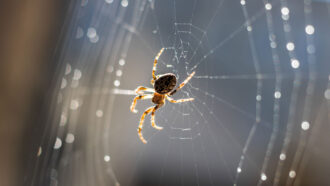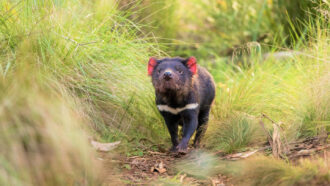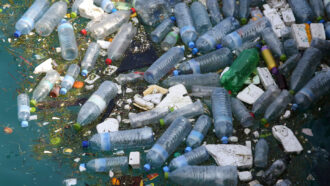
Alison Pearce Stevens is a former duck wrangler, beekeeper and forever science geek who specializes in writing about science and nature for kids. She lives in the Midwest with her husband, their two kids and a small menagerie of cuddly (and not-so cuddly) critters. She writes for Science News Explores, Highlights, ASK (Arts and Sciences for Kids) magazine and National Geographic Kids' Books. Her next book, Rhinos in Nebraska, comes out in 2021. She is also an avid gardener who can often be found in her yard, checking out the critters that call it home.

All Stories by Alison Pearce Stevens
-
 Animals
AnimalsOrb-weaving spiders use their webs like external eardrums
Scientists discover that orb-weaving spiders listen with their legs, detecting sound vibrations that travel through their silken webs.
-
 Brain
BrainWarning! Nicotine poses special risks to teens
Even a single dose of nicotine during early teen years can start a life-long cycle of nicotine use and addiction.
-
 Health & Medicine
Health & MedicineYour bloodstream may be littered with the plastic you’ve eaten
For the first time, scientists have found plastic particles circulating in human blood. No one yet knows whether those polluting bits might pose a risk to health.
-
 Computing
ComputingFacial expressions could be used to interact in virtual reality
New technology allows people to interact with virtual environments using just their facial expressions.
-
 Environment
EnvironmentWe all unknowingly eat plastic, which may host toxic pollutants
In the environment, plastics attract all types of toxic chemicals. If ingested, new data show, chemicals on those plastic bits may harm the gut.
-
 Chemistry
ChemistryNew process can transform urban CO2 pollution into a resource
Researchers have developed a liquid metal that breaks down carbon dioxide in the air, converting it from a climate threat into a valuable raw material.
-
 Psychology
PsychologyAddiction can develop when reward-seeking changes a teen’s brain
Over time, the pleasure disappears and craving grows. That craving causes stress that can drive people to use drugs or pursue unhealthy behaviors again and again.
-
 Psychology
PsychologyWe all imagine being friends with celebrities. Is that a bad thing?
One-sided relationships with celebrities and fictional characters are normal. They also can boost self-esteem and empathy.
-
 Animals
AnimalsRewilding returns lost species to strengthen ecosystems
Restoring the missing species can help undo human-caused problems by aiding forests, slowing climate change and reducing wildfires.
-
 Environment
EnvironmentEveryday plastics can pollute, leaching thousands of chemicals
Plastic bags and containers leach potentially toxic chemicals into both food and water, but researchers yet don’t know how they might affect health.
-
 Health & Medicine
Health & MedicineA single vape session can harm immune cells in the body
Vaping creates molecules in the body that can attack cells and cause damage.
-
 Health & Medicine
Health & MedicineStarting schools later leads to less tardiness, fewer ‘zombies’
Students attending schools with later start times feel more awake during the day and are less likely to oversleep and be late for class.